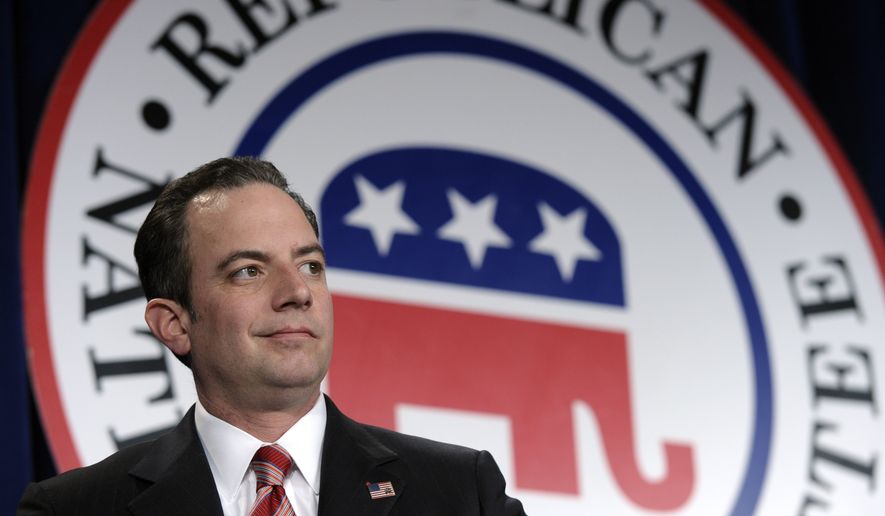Fresh off the GOP’s election sweep, Republican National Committee chairman Reince Priebus is signaling he plans to run for a third term as the party’s chief.
Just a few blocks from the White House, Mr. Priebus told a breakfast with reporters on Friday that he “leans” toward a re-election run and will announce his decision in the first week of December.
He is not expected to face serious competition for the job, and announcing so close to the mid-January RNC chairman’s election gives him a tactical advantage since it leaves any potential challenger little to time to prepare.
GOP lawmakers and RNC committee members have long expressed confidence privately that Mr. Priebus would seek re-election. If he wins a third term, it would be virtually unprecedented.
Frank J. Fahrenkopf Jr.’s 1983-1989 stint was the second and last time that a chairman served three terms since the 1856 founding of the GOP. But Mr. Fahrenkopf’s chairmanship spanned all but two of Ronald Reagan’s eight years as president. If re-elected, Mr. Priebus would serve all three terms under a Democratic president.
Traditionally the Republican or Democrat in the Oval Office picks his party’s national chairman and the members of the RNC or its counterpart, the Democratic National Committee, dutifully vote that person into the chairmanship.
Mr. Priebus has been a different kind of chairman in a number of ways. He commissioned a post-2012 election “autopsy” study that came back with the recommendation that the GOP should immediately take on “immigration reform” to improve the GOP’s image among independent and many GOP voters for the 2014 elections.
In the face of an instant backlash from those Republicans who see the twinning of “immigration” and “reform” as code for amnesty for illegals, an agile Mr. Priebus said neither he nor anyone at the RNC had made that recommendation. And he has argued he thinks border security must precede any discussion of other reform measures. He said same thing on Friday.
Nonetheless, Mr. Priebus has talked about the need to reach out to black and Hispanic voters, and has actually put paid RNC staff into minority communities, making for the first-ever GOP presence in most of those places.
“He’s been good at working with state parties with large African-American populations,” said District of Columbia GOP Chairman Ron Phillips. “He’s made a difference here in D.C.”
Mr. Priebus also led the GOP during the disappointing presidential elections of 2012, when the GOP’s vaunted “ground game” of cutting edge computer targeting of voters crashed and burned.
But Mr. Priebus has managed to remain popular with the right, center and left of his party. He did this by tipping his hat on occasion to each of them and adopting as many of their ideas as possible.
He did it by paying more than minimal attention to evangelical and social conservative members, now almost a third of the RNC’s membership. He also became the first RNC chairman to lead a national anti-abortion march on Washington.
But most important to the GOP legislative leaders like Senate leader Mitch McConnell and House Speaker John Boehner who rely on financial help from the RNC, Mr. Priebus showed himself to be a prodigious fundraiser who quickly won — and kept the respect and trust of — the party’s mega-donors and as well as its millions of smaller contributors.
“Diplomatically navigating among the various conservative elements within the GOP coalition makes him one of the most effective chairman in our Party’s history,” said Colorado Republican Chairman Ryan Call.
Not necessarily ready for the role of prime time national spokesman when he ascended to the RNC chairmanship, Mr. Priebus has since learned by doing, some Republicans say.
“He has mastered the complexities of working with grass roots, elected officials, donors and the media better than any modern chairman of the RNC,” said Arizona RNC member Bruce Ash.
Mr. Priebus’ RNC raised $13.5 million in September, which he said was “the best midterm September on record for fundraising.”
Before winning election over then-RNC Chairman Michael Steele in January 2011, Mr. Priebus was Mr. Steele’s general counsel at the RNC and personal adviser. Mr. Steele was the party’s first black national chairman. At the same time, Mr. Priebus served as chairman of the GOP in Wisconsin, where Gov. Scott Walker on Tuesday won election to a second term, increasing the possibility Mr. Walker will run for the 2016 GOP presidential nomination.
While Mr. Priebus has caused some unrest among members and critics outside the committee at times, he has won admiration by what Republicans Overseas CEO Solomon Yue calls an ability to “think outside the box strategically and deliver what he promises without compromising his core conservative principles.”
When some in the press were playing a criticism of the GOP uttered by Kentucky Republican Sen. Rand Paul as a slap at Mr. Priebus’ leadership, Mr. Priebus turned it around to his advantage.
“The Republican Party brand sucks and so people don’t want to be a Republican and for 80 years, African-Americans have had nothing to do with Republicans,” Mr. Paul said.
Instead of ducking or counter-punching, Mr. Priebus said, “Rand Paul is saying what I’ve been saying, which is we have spent way too long as a national party showing up at the end, and we’ve got to do better.”
Mr. Priebus noted at Friday’s breakfast Republicans got a significantly larger share of the Hispanic vote on Nov. 4.
Nationally, the GOP reduced the 38 percentage-point edge that Democrats had over Republicans in 2012 to 28 points this election, according to polls.
Moving the black vote by anything approaching that number didn’t happen in 2014 and remains the challenge for the GOP – and for Mr. Priebus, if he remains at the RNC’s helm beyond January.
• Ralph Z. Hallow can be reached at rhallow@gmail.com.




Please read our comment policy before commenting.